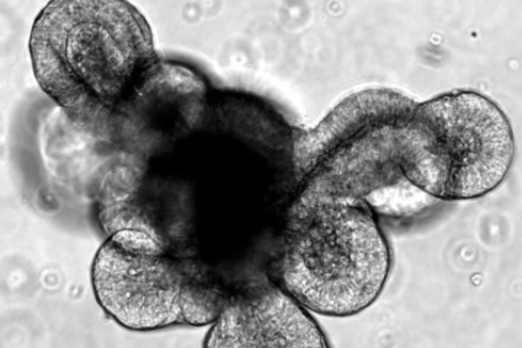20 December 2016. A Canadian biotechnology enterprise is licensing a technology that generates organoids, three-dimensional clusters of cells from stem cells that can form into gastrointestinal organs. Financial aspects of the licensing agreement between StemCell Technologies Inc. in Vancouver and Cincinnati Children’s Hospital in Ohio were not disclosed.
StemCell Technologies produces cell culture media and reagents for research in the life sciences. The company in recent years began expanding its work to stem cells used in regenerative medicine, particularly the transformation of pluripotent stem cells into organoids. Earlier this year, StemCell signed a licensing deal with the Institute of Molecular Biotechnology in Austria for organoids that simulate brain tissue.
Organoids offer advantages to researchers over two-dimensional cell models, in that they more closely resemble the complex nature and structure of whole organs, making them better options for drug testing. In addition, organoids can be produced in lab cultures rather than taking tissue samples in biopsies that require surgery. As reported recently in Science & Enterprise, in September researchers at UCLA developed organoids simulating lung tissue from adult pluripotent stem cells.
StemCell is licensing the technology developed by James Wells, director of the Pluripotent Stem Cell Center at Cincinnati Children’s Hospital who studies development of the endoderm, cells and tissue in the lining of the esophagus, stomach, and intestines as well as the lungs, pancreas, and liver. Research in Wells’s lab created functioning human intestinal tissue from pluripotent stem cells, to better understand birth defects leading to congenital gastrointestinal disorders. Wells and colleagues describe their development of organoids for gastrointestinal tissue in a 2014 article in the journal Nature.
The agreement gives StemCell Technologies an exclusive license to Wells’s technology to generate organoid cell models. StemCell is also expected to develop related cell culture media and tools from the license that enable scientists to produce organoids from pluripotent stem cells in their own labs. StemCell already offers a culturing medium that supports intestinal organoids.
“There is a tremendous opportunity,” says Wells in a Cincinnati Children’s statement, “to use these new organoid models for advancing studies in human development, as well as for applying them in many powerful applications such as disease modeling, drug screening, and for developing therapeutics.”
Read more:
- Stem Cells Shown to Regenerate Dental Pulp Tissue
- Trial Testing Stem-Cell Implant for Cartilage Repair
- Stem Cell Therapy Company Formed, Staked to $225M
- Start-Up Reprogramming Stem Cells to Treat Heart Failure
- Trial Testing Retina Cell Implants for Glaucoma
* * *


 RSS - Posts
RSS - Posts
You must be logged in to post a comment.